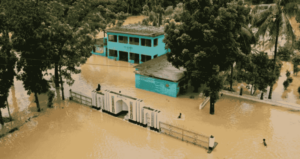Severe floods in Bangladesh have wiped out approximately 1.1 million metric tons of rice, leading to significant disruptions in the country’s agriculture and food supply. These floods, intensified by monsoon rains and upstream runoff, have created a pressing need for rice imports, as food prices continue to surge across the nation.
Impact of the Floods
Extensive Damage
- Rice Crops: The floods, occurring in August and October, hit Bangladesh in two waves, causing immense damage. The destruction of rice crops, particularly in the northern and eastern regions, has been devastating for farmers and the overall food supply.
- Loss of Lives: At least 75 people have lost their lives due to the flooding, and millions more have been affected by the resulting damage to crops and infrastructure.
Government’s Response to the Crisis
To address the crisis, the Bangladesh government is taking swift action:
- Rice Imports: Bangladesh is set to import 500,000 tons of rice to make up for the lost production. Officials have indicated that private sector imports will also soon be allowed to ease the shortfall.
- Efforts to Stabilize Food Prices: In recent months, food prices have increased by nearly 20%, adding pressure on the interim government. The administration is taking measures to manage inflation and ensure the availability of staple foods like rice.
Broader Agricultural Impact
In addition to rice, the floods have destroyed over 200,000 tons of vegetables, leading to a total estimated agricultural loss of around 45 billion taka (approximately $380 million). This has raised concerns about the overall food security of the nation.
Bangladesh’s Rice Production and Climate Vulnerability
As the world’s third-largest rice producer, Bangladesh relies heavily on domestic production to feed its 170 million people. However, natural disasters such as floods often disrupt this balance, forcing the country to rely on imports.
- Vulnerability to Climate Change: Bangladesh’s susceptibility to extreme weather is worsening due to climate change. A 2015 analysis from the World Bank Institute highlighted that 3.5 million people in the country face the risk of annual flooding, a threat that is increasing with global temperature rises.
The Way Forward: Investing in Resilient Crops
In light of these recurring challenges, agricultural experts emphasize the need to develop resilient crop varieties:
- Flood- and Drought-Tolerant Crops: Khandakar Mohammad Iftekharuddaula, a leading scientist at the Bangladesh Rice Research Institute, has stressed the importance of investing in research for flood- and drought-resistant rice varieties. By focusing on crops that can withstand changing weather patterns, Bangladesh can better ensure food security in the face of climate-related challenges.
Significant Loss
The devastating floods in Bangladesh have caused significant losses in rice production and other agricultural products. The government’s quick response in importing rice is aimed at stabilizing the food supply, but long-term solutions are needed. Investing in climate-resilient crops will be key to reducing the nation’s vulnerability to future disasters.
















